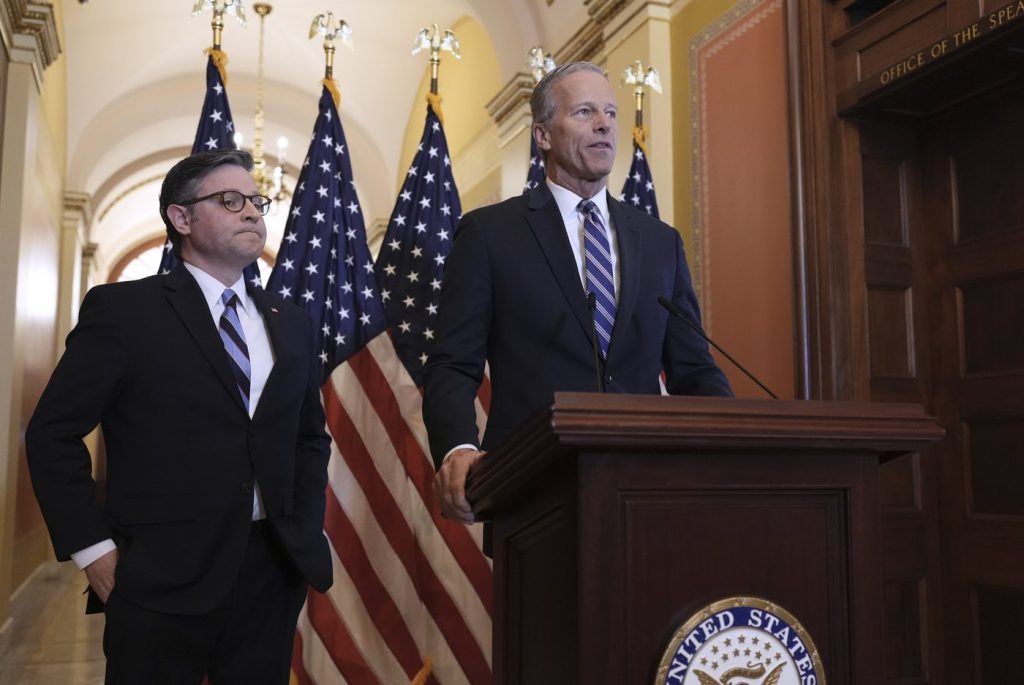WASHINGTON (AP) – Republicans have successfully secured a narrow victory with their budget plan, but the more challenging task lies ahead. The recently adopted resolution serves as a preliminary measure that enables Republicans to draft legislation capable of passing through Congress without Democratic support. They now shift their focus to creating a final bill that balances substantial spending cuts sought by conservative members while also considering the electoral vulnerability of lawmakers whose constituents rely on essential safety net programs.
With slim majorities in both the House and Senate, the Republican Party can lose very few votes, granting significant leverage to each lawmaker in the legislative process. "It’s going to take all of us to get it done," commented House Majority Leader Steve Scalise, R-La. However, the path they must navigate is intricate and fraught with obstacles.
One of the major Republican objectives is to extend the individual tax cuts approved during Donald Trump’s first term before they expire at the end of the year. The legislation is expected to encompass more ambitious tax reductions, including proposals to eliminate income taxes on tips and overtime. Yet, tax cuts are only one piece of the equation. Conservative members in the House provided the crucial votes for the budget's passage, contingent upon assurances from leadership to include at least $1.5 trillion in spending cuts in the final product. This will likely necessitate alterations to federal programs such as Medicaid, which could arouse dissent within the party.
Senate Democratic leader Chuck Schumer warned that the struggles faced by Republicans thus far are merely a prelude to the challenges ahead. Representative Max Miller, R-Ohio, reflected on the difficult discussions that await as he noted conflicting priorities within the party, particularly concerning Medicaid. Trump has made it clear he opposes any reductions in benefits for individuals receiving Medicaid coverage, contradicting some conservatives’ desires for steep spending cuts. "If it’s this rocky now, it’s only going to get worse from here on out if the speaker is not able to get the entire conference in line," Miller stated.
Democrats have framed the upcoming debate as one where Republicans are intent on slashing essential government programs to facilitate tax reductions that primarily benefit wealthier households. This narrative is one that Democrats plan to emphasize leading up to the 2026 midterm elections. Representative Jim McGovern, D-Mass, remarked on the concerns moderates may face, as they balance party pressures with the need to explain their actions to constituents who may be affected by such cuts.
Some Republicans have also made it clear to leadership that they will vigilantly watch any proposed changes to Medicaid in the final bill. Representative Nicole Malliotakis, R-N.Y., stressed the importance of ensuring that vulnerable populations do not suffer from cuts, while Senator Susan Collins, R-Maine, said she has conveyed her strong opposition to any Medicaid cuts affecting low-income families and other underserved groups.
While Republicans assert that their plans include work requirements and stricter eligibility assessments for Medicaid beneficiaries, Democrats maintain that it is unrealistic to achieve the projected savings without negatively impacting benefits. Concurrently, the Republican Party views extending both individual and estate tax cuts from Trump’s administration as critical to their electoral victory in the coming year. The House Ways and Means Committee projects that a family of four earning the median U.S. income of $80,610 would face a $1,695 increase in taxes if these cuts are not extended.
Over recent years, Republicans have laid the blame for the increasing national debt at the feet of the Biden administration. A significant test will emerge as they attempt to extend tax cuts while maintaining this narrative. An estimate from the Joint Committee on Taxation suggests that extending the tax breaks from 2017 would result in an addition of $5.5 trillion over the next decade, considering interest, and $4.6 trillion excluding interest. Proposals aligned with Trump’s campaign could drive that figure to a staggering $7 trillion.
Senator Lindsey Graham, R-S.C., expressed that he would encourage leaders to divide the measures into two reconciliation bills if progress continues to lag. "I’m going to say break it apart, because they need money for the border yesterday and they also need money for DoD," Graham noted, referring to the Department of Defense.
House Speaker Mike Johnson remains optimistic about overcoming the challenges ahead, stating, "The American people are counting on us." Meanwhile, Representative Tom Cole, R-Okla., expressed confidence that the voting dynamics would favor the House, suggesting that Senate members would yield rather than impose what could be the largest tax increase in American history on their constituents. "Our majority is much more on the line than theirs," Cole asserted.










